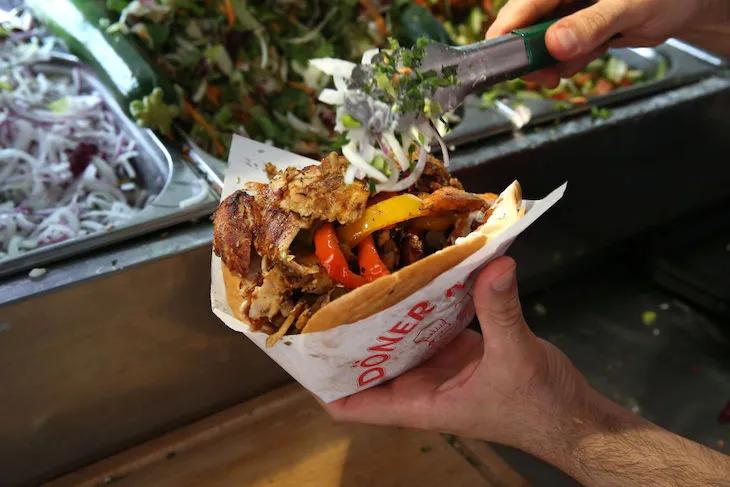The Spectator, October 5, 2024
Last April, German president Frank-Walter Steinmeier decided to bring along a 60-kilogram döner kebab on his state visit to Turkey. It did not go down well. Turks found the stunt condescending; Germans were mortified. Ankara lodged an official request with the European Commission to make the dish a ‘traditional speciality’, thereby regulating what can be sold under the name ‘döner’ in Europe.
This spat isn’t, of course, the first time Germany and Turkey have failed to see eye to eye. In 2022, the Turkish authorities clamped down on German state broadcaster Deutsche Welle in a row over licensing; in 2019, Germany imposed an arms export bans on Turkey over its role in the Syrian civil war. Back in 2016, a German standup comedian provoked a major diplomatic row between Berlin and Ankara over a poem insulting the Turkish president Recep Tayyip Erdoğan.
Though seemingly rather mundane, the latest disagreement over the classification of döner kebab indicates there is little love lost between the two capitals. Turkey aims to standardise and dictate through the European Commission what can be sold as döner kebab, breaking it down to the finest details, such as the meat composition, pH value, salt content, and the thickness of the slices that come off. German politicians and business owners, including those of Turkish background, are not happy.
Today, the döner kebab is the most popular fast food in Germany, even more than the godforsaken currywurst. A German village so small that it does not even have a pub might still have a döner kebab eatery. It was introduced by the Turkish migrant workers in the 1960s and 1970s. As often happens with dishes cooked far from their motherlands, the döner kebab started to be prepared in ways different from the ‘original’, catering to local tastes with the available ingredients.
‘Döner kebab is now a central element in German culture, especially among the youth,’ says Niko Schmitz, an anthropology student living in Cologne. ‘After clubbing, you always have a döner kebab. Due to the garlic sauce and the raw onions, it is better not to have it before though.’
Schmitz, personally, is not too bothered about the potential new regulations and eateries having to sell it under a different name such as the Greek gyros or the Arabic shawarma. What he finds most concerning is the rising price of döner kebab.
‘A few years ago, the price of a döner kebab was around four euros. Now you pay up to eight-thirteen euros,’ he laments. Schmitz is not alone. ‘I’m paying eight euros for a döner,’ a protestor shouted at chancellor Olaf Sholz in 2022. ‘Speak with Putin, please. I want to pay four euros for a döner.’
Last week, Germany lodged its objection to Turkey’s application to regulate döner kebab. The European Commission gave six months to the countries to come to an agreement. The negotiations have already begun.
‘We are working together with state officials in Ankara to work out a deal,’ a representative from the International Döner Federation told me. As talks are ongoing, they did not want to make any further statements.
The döner itself can be traced back to the early 19th century Ottoman Empire, when someone had the ingenious idea of flipping the existing horizontal stack of marinated meat on an iron rod vertically. Turning the rotisserie upright not only saved much of the juices and fat from dripping into the fire but also rendered it more suitable for urban spaces.
‘Regulating it could improve the quality,’ agrees Murat Doğangün, a chef at the Şahin restaurant, once a favourite of the legendary Anthony Bourdain in Istanbul. ‘The most important thing, however, is not regulation but a good chef and a good source of meat. We make our own döner from 80 per cent beef and 20 per cent lamb.’ The result is a truly delicious stack of meat shreds served on a flatbread with yoghurt or on rice. As a proud Muslim chef, he feels that pork döner – commonly found in some European countries – is unethical and should be sold under a different name.
As happened with Sweden’s Nato accession, Ankara is no foreigner to dragging its feet in order to exert pressure on other issues – in that case, it was the purchase of F-16 fighter jets from the US. On this occasion, Turkey isn’t aiming to regulate döners in Germany just to gain an extra bargaining chip. The bust-up is, of course, also about nationalistic pride expressed through food, as it is so often done. But should Germany grant their demands on different topics altogether, the Turks would likely ease their stance on the specification of the döner kebab.
Daniel Thorpe
Daniel Thorpe is an Istanbul-based journalist covering politics and economics in Turkey and Eastern Europe

